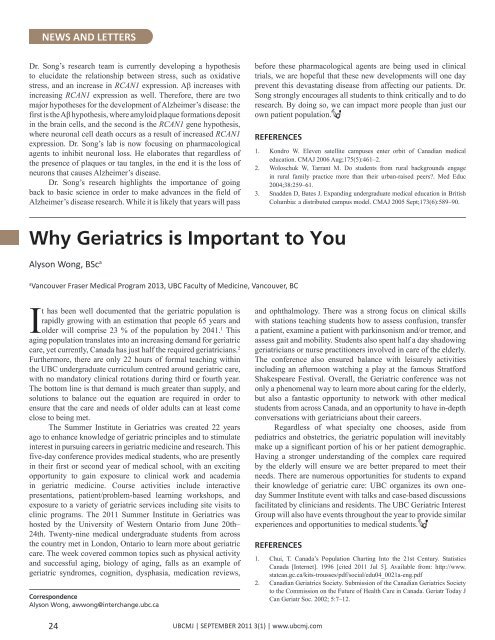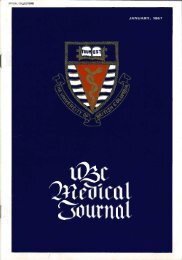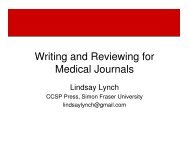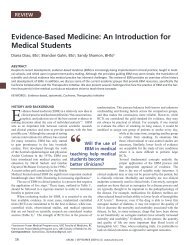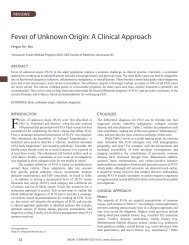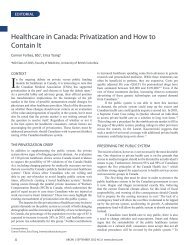Download full PDF - UBC Medical Journal
Download full PDF - UBC Medical Journal
Download full PDF - UBC Medical Journal
Create successful ePaper yourself
Turn your PDF publications into a flip-book with our unique Google optimized e-Paper software.
NEWS AND LETTERS<br />
Dr. Song’s research team is currently developing a hypothesis<br />
to elucidate the relationship between stress, such as oxidative<br />
stress, and an increase in RCAN1 expression. Aβ increases with<br />
increasing RCAN1 expression as well. Therefore, there are two<br />
major hypotheses for the development of Alzheimer’s disease: the<br />
first is the Aβ hypothesis, where amyloid plaque formations deposit<br />
in the brain cells, and the second is the RCAN1 gene hypothesis,<br />
where neuronal cell death occurs as a result of increased RCAN1<br />
expression. Dr. Song’s lab is now focusing on pharmacological<br />
agents to inhibit neuronal loss. He elaborates that regardless of<br />
the presence of plaques or tau tangles, in the end it is the loss of<br />
neurons that causes Alzheimer’s disease.<br />
Dr. Song’s research highlights the importance of going<br />
back to basic science in order to make advances in the field of<br />
Alzheimer’s disease research. While it is likely that years will pass<br />
before these pharmacological agents are being used in clinical<br />
trials, we are hopeful that these new developments will one day<br />
prevent this devastating disease from affecting our patients. Dr.<br />
Song strongly encourages all students to think critically and to do<br />
research. By doing so, we can impact more people than just our<br />
own patient population.<br />
REFERENCES<br />
1. Kondro W. Eleven satellite campuses enter orbit of Canadian medical<br />
education. CMAJ 2006 Aug;175(5):461–2.<br />
2. Woloschuk W, Tarrant M. Do students from rural backgrounds engage<br />
in rural family practice more than their urban-raised peers. Med Educ<br />
2004;38:259–61.<br />
3. Snadden D, Bates J. Expanding undergraduate medical education in British<br />
Columbia: a distributed campus model. CMAJ 2005 Sept;173(6):589–90.<br />
Why Geriatrics is Important to You<br />
Alyson Wong, BSc a<br />
a<br />
Vancouver Fraser <strong>Medical</strong> Program 2013, <strong>UBC</strong> Faculty of Medicine, Vancouver, BC<br />
It has been well documented that the geriatric population is<br />
rapidly growing with an estimation that people 65 years and<br />
older will comprise 23 % of the population by 2041. 1 This<br />
aging population translates into an increasing demand for geriatric<br />
care, yet currently, Canada has just half the required geriatricians. 2<br />
Furthermore, there are only 22 hours of formal teaching within<br />
the <strong>UBC</strong> undergraduate curriculum centred around geriatric care,<br />
with no mandatory clinical rotations during third or fourth year.<br />
The bottom line is that demand is much greater than supply, and<br />
solutions to balance out the equation are required in order to<br />
ensure that the care and needs of older adults can at least come<br />
close to being met.<br />
The Summer Institute in Geriatrics was created 22 years<br />
ago to enhance knowledge of geriatric principles and to stimulate<br />
interest in pursuing careers in geriatric medicine and research. This<br />
five-day conference provides medical students, who are presently<br />
in their first or second year of medical school, with an exciting<br />
opportunity to gain exposure to clinical work and academia<br />
in geriatric medicine. Course activities include interactive<br />
presentations, patient/problem-based learning workshops, and<br />
exposure to a variety of geriatric services including site visits to<br />
clinic programs. The 2011 Summer Institute in Geriatrics was<br />
hosted by the University of Western Ontario from June 20th–<br />
24th. Twenty-nine medical undergraduate students from across<br />
the country met in London, Ontario to learn more about geriatric<br />
care. The week covered common topics such as physical activity<br />
and successful aging, biology of aging, falls as an example of<br />
geriatric syndromes, cognition, dysphasia, medication reviews,<br />
Correspondence<br />
Alyson Wong, awwong@interchange.ubc.ca<br />
and ophthalmology. There was a strong focus on clinical skills<br />
with stations teaching students how to assess confusion, transfer<br />
a patient, examine a patient with parkinsonism and/or tremor, and<br />
assess gait and mobility. Students also spent half a day shadowing<br />
geriatricians or nurse practitioners involved in care of the elderly.<br />
The conference also ensured balance with leisurely activities<br />
including an afternoon watching a play at the famous Stratford<br />
Shakespeare Festival. Overall, the Geriatric conference was not<br />
only a phenomenal way to learn more about caring for the elderly,<br />
but also a fantastic opportunity to network with other medical<br />
students from across Canada, and an opportunity to have in-depth<br />
conversations with geriatricians about their careers.<br />
Regardless of what specialty one chooses, aside from<br />
pediatrics and obstetrics, the geriatric population will inevitably<br />
make up a significant portion of his or her patient demographic.<br />
Having a stronger understanding of the complex care required<br />
by the elderly will ensure we are better prepared to meet their<br />
needs. There are numerous opportunities for students to expand<br />
their knowledge of geriatric care: <strong>UBC</strong> organizes its own oneday<br />
Summer Institute event with talks and case-based discussions<br />
facilitated by clinicians and residents. The <strong>UBC</strong> Geriatric Interest<br />
Group will also have events throughout the year to provide similar<br />
experiences and opportunities to medical students.<br />
REFERENCES<br />
1. Chui, T. Canada’s Population Charting Into the 21st Century. Statistics<br />
Canada [Internet]. 1996 [cited 2011 Jul 5]. Available from: http://www.<br />
statcan.gc.ca/kits-trousses/pdf/social/edu04_0021a-eng.pdf<br />
2. Canadian Geriatrics Society. Submission of the Canadian Geriatrics Society<br />
to the Commission on the Future of Health Care in Canada. Geriatr Today J<br />
Can Geriatr Soc. 2002; 5:7–12.<br />
24<br />
<strong>UBC</strong>MJ | SEPTEMBER 2011 3(1) | www.ubcmj.com


